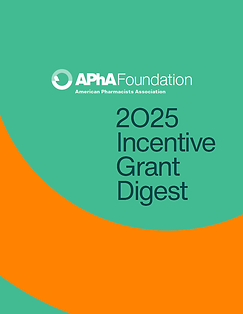Incentive Grants
Inaugurated in 1993, the Incentive Grants for Practitioner Innovation in Pharmaceutical Care is the APhA Foundation’s longest running program. Grants totaling more than $500,000 have facilitated the development of over 600 pharmacy-based projects, improving the health outcomes of thousands of patients across the country.
Incentive Grants offer pharmacists, students, and community pharmacy residents seed money to implement or support an existing innovative patient care service within their pharmacy practice. We have been able to provide this support due in part to the Community Pharmacy Foundation.
The Community Pharmacy Foundation has generously provided matching grant support to fund the APhA Foundation Incentive Grants Program since 2004. The Community Pharmacy Foundation supports research and demonstration projects that highlight new and emerging innovations in patient care related to community pharmacy practice.
Learn more about the Community Pharmacy Foundation and their work.
The Incentive Grants have been a starting point for many pharmacists, residents, and students for active involvement and leadership within APhA, the Foundation, and in practice. Just as important, awarding an incentive grant encourages practitioners to foster new ideas and allows them to “lead by example.”
Aligned with the Foundation’s focus on designing and evaluating new practice models for pharmacy, the core requirement of the Incentive Grants Program is a focus on innovation. The Foundation has funded projects in past years that address a variety of meaningful patient care services and will continue to accept proposals for any type of ambulatory pharmacy-based innovation.
Incentive Grants are awarded annually on a calendar year. Grant recipients will be required to submit an interim report, a final project report, a final project expense report, and a short video summary of their project.
Watch this 5-minute recap to learn more about the 2025-2026 grant deadlines, application process, and funding.
Residents and their Preceptors
Residents and their preceptors may apply for a Residents and their Preceptors Incentive Grant ($1000). A project proposal with any community/ambulatory-pharmacy based practice innovation is acceptable, but preference will be given to projects with a focus in the following areas:
-
Innovative payment models
-
Social determinants of health
-
Transitions of care
-
Access and pharmacy deserts
-
Medication safety
-
Pharmacy workplace conditions
-
Mental/behavioral health
-
Diabetes/cardiovascular care
-
Maternal health
-
Substance use disorder
-
Test and treat
-
Interoperability/data integration
-
Patient care service implementation
-
Role of the pharmacy technician
-
Role of pharmacists in primary care
Rothholz Family Innovation in Immunization Practices
Student pharmacists and pharmacists may apply for an Innovation in Immunization Practices Incentive Grant ($1000).
Preference will be given to projects within the following focus areas:
-
Enhancing vaccine confidence among patients
-
Increasing access to/uptake of vaccines within identified populations: urban, suburban, and rural across the lifespan.
-
Optimizing engagement of pharmacy team members in the provision of immunization-related services
-
Advance usage of technology to increase public knowledge and vaccine uptake, including use of Immunization Information Systems (IIS) for immunization assessment and enhanced immunization delivery methods
-
Collaboration with other members of the immunization neighborhood to increase public knowledge, understanding, acceptance and receipt of recommended vaccines.

Use of Grant Funds
Full payments will be made upon receipt of the completed Grant Acceptance/Agreement forms. Grant funds may be used only for direct costs associated with the development and implementation of the project described in the application. Expenditures for indirect costs (overhead) will not be funded. Salaries for recipients will not be allowed; however, consultant fees, fees for research/technician services and expenses for administrative services may be allowed if submitted in the proposed budget to the APhA Foundation.
Final expense reports must be submitted once the project has ended. Reports shall include funding descriptions, vendors, dates of issue and any other relevant information.


















































